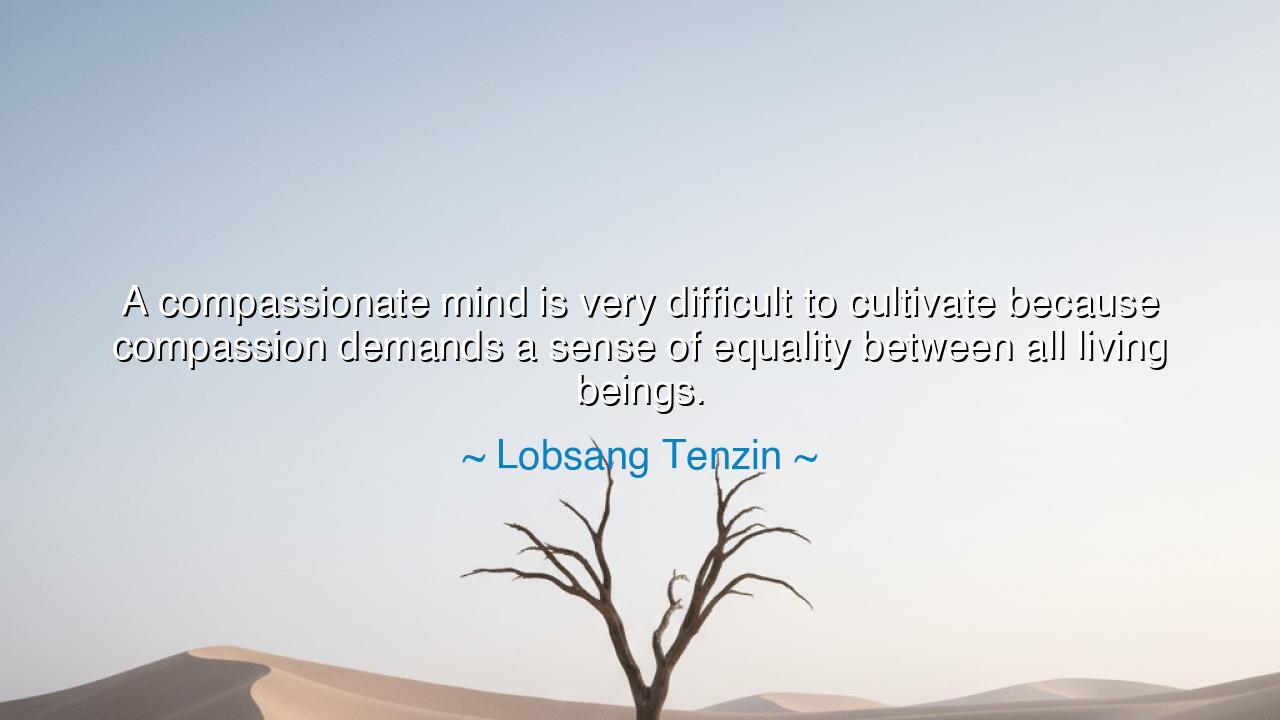
A compassionate mind is very difficult to cultivate because
A compassionate mind is very difficult to cultivate because compassion demands a sense of equality between all living beings.






In the words of Lobsang Tenzin, “A compassionate mind is very difficult to cultivate because compassion demands a sense of equality between all living beings.” This teaching flows like water from the mountain springs of Buddhist wisdom, yet it speaks to the condition of all humanity. It tells us that compassion is not a mere feeling of pity or kindness, but a discipline of the heart, a transformation of vision, a way of seeing others as ourselves. To live in true compassion is to tear down the walls of superiority and self-interest, and to recognize that every creature shares the same longing for life, freedom, and peace.
The ancients always held compassion as one of the highest virtues, but they knew its difficulty. For it demands not only love for those we cherish, but also mercy for the stranger, the enemy, and even the smallest creatures that crawl upon the earth. To practice compassion is to confront the pride of the ego, which always whispers: “I am greater, my suffering matters more, my life is worthier.” Lobsang Tenzin reminds us that equality is the root of compassion—without it, kindness becomes condescension, and generosity becomes domination.
History itself bears witness to this truth. Consider the story of Emperor Ashoka of India. Once a conqueror drenched in blood, he turned away from violence after seeing the devastation of war. Embracing the teachings of the Buddha, he declared all life sacred, protecting both man and beast. He built hospitals not only for humans but for animals, acknowledging their equality in the great web of existence. His transformation revealed that a compassionate mind could reshape an empire, not through conquest, but through recognition of shared life.
Yet, we must not romanticize compassion as easy or effortless. It is, as Lobsang Tenzin teaches, “very difficult to cultivate.” It requires patience to see beyond our anger, humility to see beyond our pride, and courage to see beyond our fear. It requires the breaking of old habits of judgment and the planting of new seeds of empathy. Like a farmer who must till stony soil again and again, so must we labor daily to soften our hearts until they can bear the harvest of compassion.
There is also a heroic power hidden in compassion. To see the enemy as equal is not weakness, but strength. To look upon the suffering of another and say, “your pain is my pain,” is to expand the boundaries of the self until it embraces the world. The ancients called such souls sages, bodhisattvas, or saints—those who live not for themselves but for the whole. And though few may reach such heights, each act of compassion, however small, draws us closer to that greatness.
The lesson for us is clear: compassion is the highest form of equality. To practice it is to honor the divine in others, to heal the divisions of society, and to bring peace where conflict reigns. But it is also a discipline, a lifelong cultivation. We must begin with small acts—listening without judgment, helping without expectation, forgiving without condition—until these acts shape our very being. For just as drops of water wear down stone, so do daily gestures of compassion transform the hardest heart.
Practical steps follow from this truth. Meditate daily on the shared humanity of others, especially those you struggle to love. Treat every being you encounter with dignity, whether rich or poor, friend or foe. Extend kindness beyond your circle, remembering that compassion has no borders. And when pride or anger rises, pause and remember the equality of life, for the person before you is no less worthy of peace and happiness than you are.
Thus, Lobsang Tenzin’s words shine as a lamp in the darkness. To cultivate a compassionate mind is difficult, yes, but it is also the noblest of labors. It demands that we see all beings in the mirror of equality, and in doing so, it transforms both the world and ourselves. Let us therefore take up this challenge, passing down to future generations the wisdom that compassion is not weakness, but the very strength that binds the universe together.






AAdministratorAdministrator
Welcome, honored guests. Please leave a comment, we will respond soon